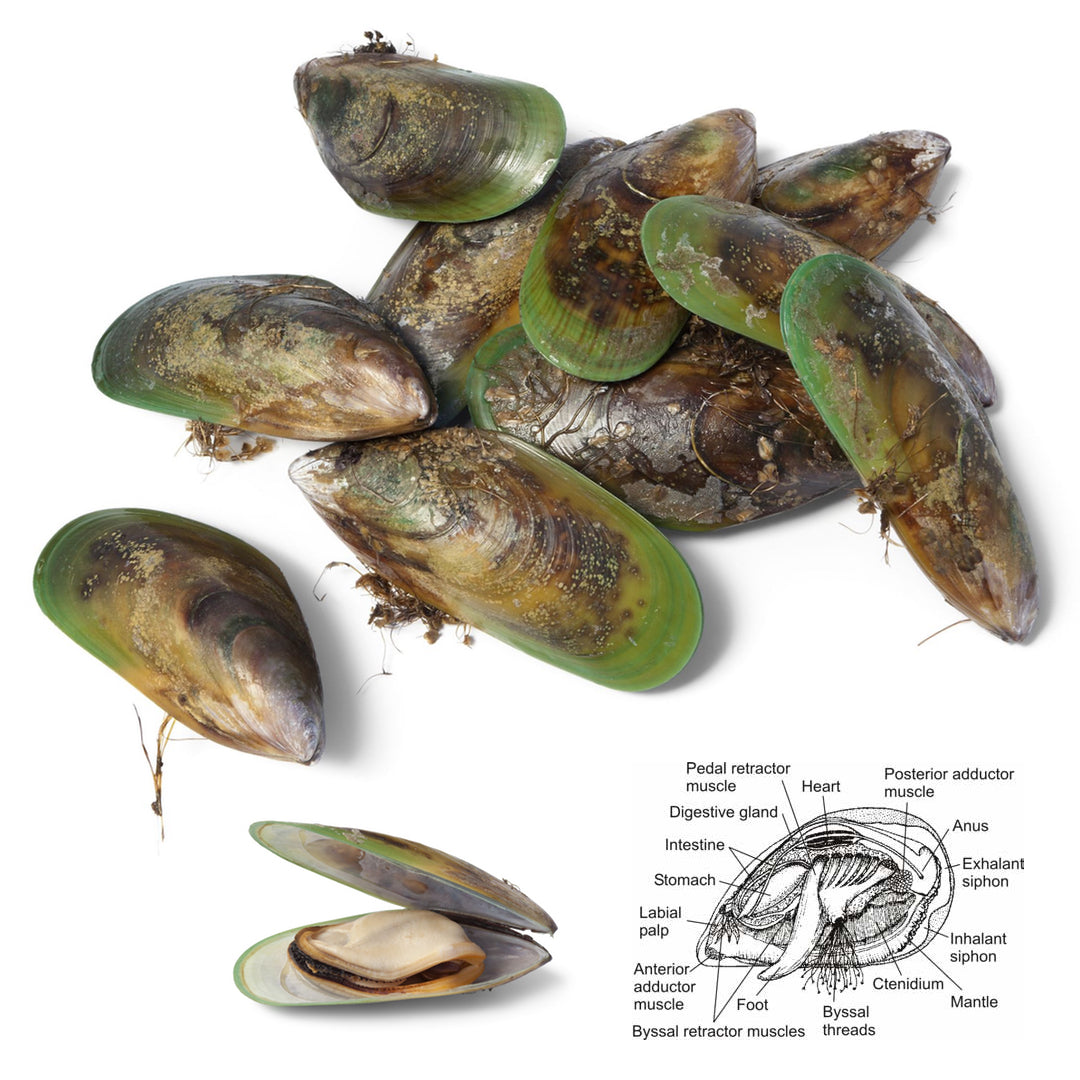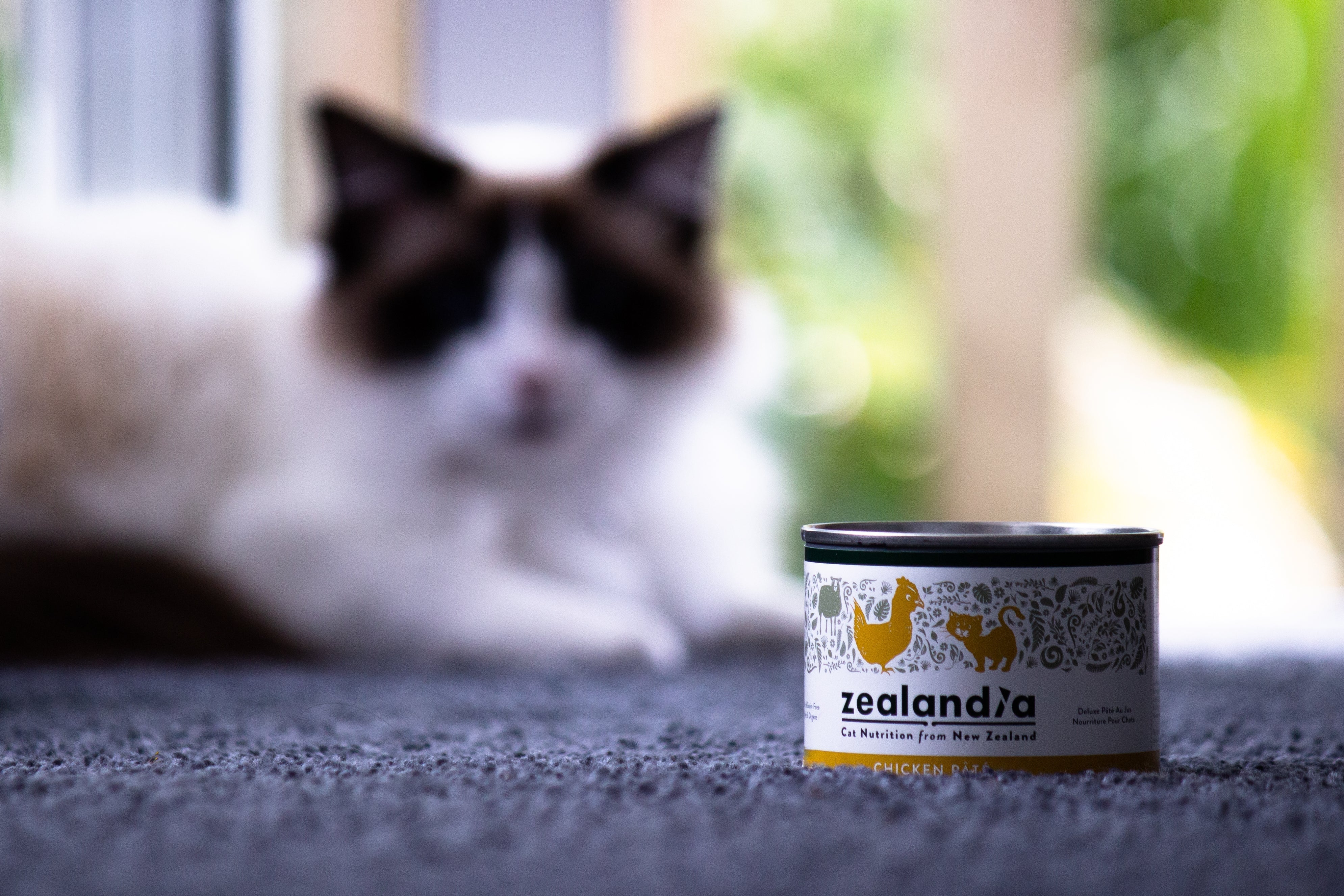Green-Lipped Mussels for Dogs: Benefits, side effects, and dosage

Written by Dr Sarah-Jane Molier BVM&S MRCVS BSc (United Kingdom)
Many pet owners and vets are now looking for more natural ways to support their pet’s health. Green-Lipped Mussel is one of these natural products with potential health benefits, it is a form of nutraceutical. Nutraceuticals are products manufactured from food, which have health or medical benefits. If you are considering using Green-Lipped Mussel, this article discusses everything you need to know about Green-Lipped Mussel for dogs.
What is green-lipped mussel?
Green-Lipped Mussel is a type of mussel found off the coasts of New Zealand. Its name comes from the green edges, or ‘lips’, to its shell. This New Zealand Green-Lipped Mussel is scientifically known as Perna canaliculus.
New Zealand’s indigenous Māori people have been eating Green-Lipped Mussels for centuries. Over 50 years ago, somebody noticed that the Māori people seemed to suffer less joint issues than people in New Zealand’s inland communities, sparking interest in the health benefits of green-lipped mussel. Its health benefits have been studied since the 1970s.
What are the parts of a mussel?
A mussel consists of two hard outer shells which are joined together by a ligament. Inside this shell lies a soft body. This soft body includes the mussel’s organs, muscles, gills, and ‘foot’. They use this muscular foot to move around. The foot also produces the mussel’s ‘beard’, or Byssus. This ‘beard’ is made up of collagen threads, which the mussel uses to attach to surfaces such as rocks.
Benefits of Green-Lipped Mussel for dogs
There are many nutrients in Green-Lipped Mussels with potential health benefits. Importantly, it is thought that the combination of nutrients working together may well be what makes Green-Lipped Mussel so effective.
Anti-inflammatory
Green-Lipped Mussel is high in omega-3 fatty acids, including eicosapentaenoic acid (EPA) and docosahexaenoic acid (DHA). These omega-3 fatty acids are also found in oily fish. Omega-3 fatty acids are well known for their anti-inflammatory properties. This means that they can help reduce swelling and pain.
However, Green-Lipped Mussel also contains an omega-3 fatty acid that can’t be found in oily fish — eicosatetraenoic acid (ETA). This is only found in the New Zealand Green-Lipped Mussel. ETA has been shown to block pain signals in the body in a similar way to non-steroidal anti-inflammatory medicines, but it does not result in the same side effects. It seems to have a stronger anti-inflammatory effect than other omega-3 fatty acids, such as those found in fish oils.
Supports Joint Repair
Green-Lipped Mussel also contains glycosaminoglycans (you may have heard of glucosamine and chondroitin — these are both glycosaminoglycans). These form part of the ‘building blocks’ of cartilage. Cartilage is the soft ‘padding’ of the joint, which helps to protect the bones and keeps the joint smooth. So, Green-Lipped Mussel can help to maintain healthy joints.
Other important nutrients found in Green-Lipped Mussel include vitamins and minerals, some with antioxidant properties. Antioxidants can help to prevent, or reduce, some types of damage to cells in the body. These nutrients include vitamin C and E, zinc, magnesium, copper, and selenium.
What is Green-Lipped Mussel used for in dogs?
All of this means that Green-Lipped Mussel may be beneficial for dogs suffering from any condition involving long-term inflammation in the body. Examples include skin conditions or asthma, but perhaps the most common one is arthritis. There is evidence that Green-Lipped Mussel reduces arthritic signs in dogs when included within the dog food, or sprinkled as a powder on top. One review of studies on Green-Lipped Mussel use in dogs concludes that most of the studies found a positive effect on arthritis.
Side effects of Green-Lipped Mussel for dogs
There are currently no known side effects of Green-Lipped Mussel in dogs. In theory, any food supplement has the potential to cause gut-related symptoms, although none have been proven with Green-Lipped Mussel.
Dogs can suffer from shellfish allergies, just as we can, although this is rare. Green-Lipped Mussel should not be given to dogs with shellfish allergies. It is also sensible not to leave your dog alone the first time you offer them any Green-Lipped Mussel or Green-Lipped Mussel extract, so that you can monitor for signs of an allergic reaction.
If your dog has a medical condition, it’s important that you consult your vet before starting them on any supplements or nutraceuticals. It’s also sensible to check with your vet first if your dog is on any medication. Although there are currently no known interactions of Green-Lipped Mussel with any medications, nutraceuticals can potentially interact with each other and with medications.
How much Green-Lipped Mussel can I give my dog?
Green-Lipped Mussel is given by mouth and can be given as a capsule, a tablet, a powder, or within the dog food itself. Some manufacturers use Green-Lipped Mussel extract, while others use the whole mussel.
More research is needed on the best dose of Green-Lipped Mussel for dogs. The dose your dog needs will depend on the way you are giving it, the quality of the product, and the size of your dog.
However, it is important to follow the manufacturer’s instructions, rather than deciding the dose yourself. This is especially important when the Green-Lipped Mussel is within a food, to avoid over- or under-feeding your dog. It is also especially important if the supplement also contains other ingredients, to avoid under or overdosing these, as some may have side effects.
Whichever form you choose, Green-Lipped Mussel is best given daily, unless the manufacturer’s instructions state otherwise. Green-Lipped Mussel is a long-term nutraceutical, meaning you will need to give it for several weeks before you see any improvement, and sometimes up to 3 months. In order to experience the full benefit, you would need to continue giving it to your dog long-term, since once you stop the effects tend to wear off after a few weeks.
If you aren’t sure about the best Green-Lipped Mussel dose for your dog, chat to your vet for advice.
Final thoughts
There is good, strong evidence that Green-Lipped Mussel can benefit dogs with arthritis. It can reduce pain and inflammation and improve mobility. Alongside lifestyle changes, a diet supplemented with Green-Lipped Mussel may also help to reduce the amount of medicine needed to treat arthritis. In fact, many vets are now recommending products containing Green-Lipped Mussel for their patients with arthritis, alongside traditional treatments. More research is needed, but Green-Lipped Mussel may also have health benefits for dogs who are suffering from any chronic inflammatory conditions, such as skin disease or asthma.
It’s safest to check with your veterinary team before adding any supplements to your dog’s diet.
FAQs
Is Green Lipped Mussel safe for dogs?
Yes, Green-Lipped Mussel is safe for most dogs and there are currently no known serious side effects. However, Green Lipped Mussel should not be given to dogs with shellfish allergies. If your dog has a medical condition or is on any medication, you should always check with your vet before starting them on any nutraceutical.
What are Green Lipped Mussels good for?
There is evidence that Green-Lipped Mussel is good for arthritis in dogs, helping to reduce inflammation and possibly playing a part in reducing the doses of traditional medications required. Green-Lipped Mussel may also be good for other conditions involving long-term inflammation in the body, such as certain skin diseases.
Is Green-Lipped Mussel an anti-inflammatory?
Green-Lipped Mussel contains omega-3 fatty acids, which are known to have anti-inflammatory properties. In particular, Green-Lipped Mussel contains one unique omega-3 fatty acid, which is thought to have powerful anti-inflammatory properties.
Does Green-Lipped Mussel help arthritis in dogs?
There is growing evidence that Green-Lipped Mussel contains nutrients that are beneficial to dogs with arthritis. These nutrients have anti-inflammatory and joint-protective properties, so Green-Lipped Mussel may reduce pain and swelling as well as support joint repair.
How long does it take for Green-Lipped Mussel to work in dogs?
On average it takes around 6-8 weeks to see an improvement with Green-Lipped Mussel. However, some dogs will respond faster than this, while others can take 12 weeks. Once you stop Green-Lipped Mussel supplements, the effects tend to wear off within a few weeks, so ideally it needs to be given long term.


